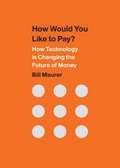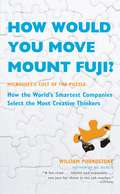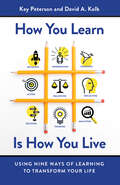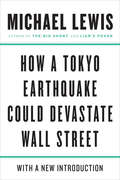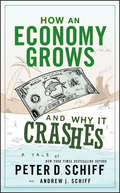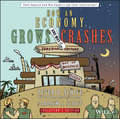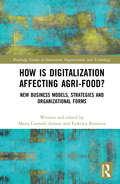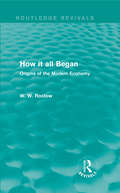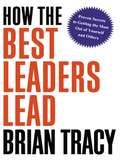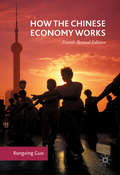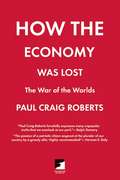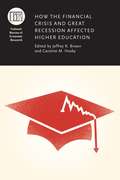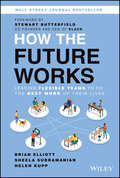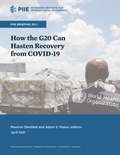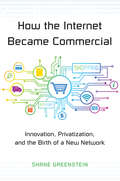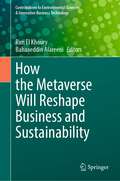- Table View
- List View
How Would You Like to Pay?: How Technology Is Changing the Future of Money
by Bill MaurerFrom Bitcoin to Apple Pay, big changes seem to be afoot in the world of money. Yet the use of coins and paper bills has persisted for 3,000 years. In How Would You Like to Pay?, leading anthropologist Bill Maurer narrates money's history, considers its role in everyday life, and discusses the implications of how new technologies are changing how we pay. These changes are especially important in the developing world, where people who lack access to banks are using cell phones in creative ways to send and save money. To truly understand money, Maurer explains, is to understand and appreciate the complex infrastructures and social relationships it relies on. Engaging and straightforward, How Would You Like to Pay? rethinks something so familiar and fundamental in new and exciting ways. Ultimately, considering how we would like to pay gives insights into determining how we would like to live.
How Would You Move Mount Fuji?: Microsoft's Cult of the Puzzle - How the World's Smartest Companies Select the Most Creative Thinkers
by William PoundstoneMicrosoft's notoriously grueling interview process has been emulated by companies everywhere that seek to separate the most creative thinkers from the merely brilliant. HOW WOULD YOU MOVE MOUNT FUJI? reveals more than 35 of these challenging riddles and puzzles and, for the first time, shows how answers can be found through creative and effective analytical thinking.
How You Got Screwed: What Big Banks, Big Government, and Big Business Don't Want You to Know—and What You Can Do About It
by Allen MarshallIf you’re like most people, you want nothing more than a fair shot in life: a chance to seek out opportunities, work hard, and make your own way in this world. But as author Allen Marshall explains in How You Got Screwed, the game has been rigged, making it almost impossible for you to win. How You Got Screwed explains exactly how the rules have been made to favor those in charge. Consider the financial system, which steals your earning power with money that doesn’t hold its value and lets banks break the law practically without consequence. Think about our politicians, who serve their donors and lobbyists, and a government more interested in serving itself than its people. And remember big business, which uses its money and political power to twist the rules in their favor, hurting you as a consumer, employee, and citizen.Yes, the cards are stacked against you. But that’s only if you play by their rules. It’s time to play your own game—and How You Got Screwed is your guide to making the system work for you.
How You Learn Is How You Live: Using Nine Ways of Learning to Transform Your Life
by David A. Kolb Kay PetersonWhat's Your Learning Style?Being a lifelong learner is one of the secrets to happiness, success, and personal fulfillment. But what's the best way to become one? Kay Peterson and David Kolb have the answer. They offer deep, research-based insights into the ideal process of learning and guide you in identifying your dominant style. You'll discover how knowing your learning style can help you with all kinds of everyday challenges, from remembering someone's name to adding a crucial professional skill to your repertoire. This book is a guide to awakening the power of learning that lies within each of us.
How You Play the Game: Lessons For Life From The Billion-dollar Business Of Sports
by Jerry Colangelo Len ShermanThis is a story of passion and commitment and faith--qualities that drove one working-class kid to not only build a sports empire, but also to change the way the entire sports industry has done business. In How You Play the Game, Jerry Colangelo, in his own words, tells how he emerged from the tough streets of Chicago Heights as a high school and college sports star...how he helped create and build the Chicago Bulls--at a time when the NBA was a second-tier professional league, and two basketball teams had already failed in the Windy City...how he moved to Arizona and started the Phoenix Suns, an organization that fought its way to become the ninth richest franchise in all of sports...and how he then began baseball's newest team, the Arizona Diamondbacks. This is a tale of determination, faith, and, most assuredly, good timing and good luck. In truth, this isn't one story--but many. Jerry weaves together a lifetime of great moments in sports and tense times in business. Peppered with stories about players and coaches, including Charles Barkley and Connie Hawkins, Red Holzman, and Buck Showalter, as well as owners, general managers, investors, reporters, and more, How You Play the Game is truly an insider's look at the sports world. Mr. Colangelo's 30-year history mirrors the evolution of sports to the global marketing and media mega-industry it is today.
How You Spend Your Time: Where Does It Go?
by Richard LueckeTaking an introspective approach to time management can be quite an eye-opening experience. This chapter emphasizes that to understand how to use time more effectively, it is important to understand how you are currently spending your time. Creating an activity log, a chronology of the day's events, is an important exercise that can be used to examine how and where you are wasting valuable time.
How Your Story Sets You Free
by Heather Box Julian Mocine-McQueen&“Human beings understand the world best through stories. . . . And in this book Heather and Julian are ace story-enablers. A must-read!&” —Bill McKibben, New York Times–bestselling author of Falter and Radio Free Vermont Everyone has a story to tell. Sharing that story can change you, your community, or even the world. But how do you start? Discover the tools to unlock your truth and share it with the world: Storytelling coaches Heather Box and Julian Mocine-McQueen reveal how to embrace the power of personal storytelling in a series of easy steps. You'll learn how to share your experiences and invaluable knowledge with the people who need it most, whether it be in a blog post, a motivational speech, or just a conversation with a loved one. How Your Story Sets You Free is the path to finding the spark that ignites the fire and reminds you just how much your story matters. • Features over 100 pages of practical and motivating advice, with quotes from renowned storytellers including Maya Angelou and Marshall Ganz. • Includes specific step-by-step instructions to help you find the words to tell your story in the most powerful and impactful way. &“Working with Heather and Julian changed everything by getting me over the hurdle that stood between what was true about my life and what I was willing to share with the world. I&’m so grateful they&’ve distilled their wisdom and vision into this book.&” —Caledonia Curry, artist who goes by Swoon &“Heather and Julian are masterful in navigating you through the funny, rocky, delicate, and sometimes scary terrain of sharing yourself boldly, humbly, and unapologetically.&” —Rha Goddess, founder CEO of Move The Crowd, author of The Calling
How a Mother Should Talk About Money with Her Daughter: A Step-by-Step Guide to Budgeting, Saving, Investing, and Other Important Lessons
by Aja McClanahanA Guide to Talking Finances with Our Daughters! As many as 56% of women feel that they&’d rather not talk about money with their loved ones. Some women say they were raised not to discuss money and others feel like the information is just too personal. Yet with many women controlling household budgets and raising the next generation of female earners, this could be a recipe for disaster in some homes and for society at large.How a Mother Should Talk About Money with Her Daughter helps readers broach money topics with their daughters in a meaningful, compassionate, and even fun way. It speaks to parents who may feel inadequate about their own money skills but still want to discuss money with their daughters while helping them build good financial habits. The goal is to start conversations that leave parents and girls empowered to love themselves (through good money management) and make the world a better place with their financial resources. Topics include how to save as a young person, the pros and cons of investing, how to determine which college is right (in terms of finances and future job prospects), how to determine a future partner is right (in terms of similar financial goals), and more.
How a Second Grader Beats Wall Street
by Allan S. RothStraightforward strategies from a successful young investorIn How a Second Grader Beats Wall Street, you'll follow the story of Kevin Roth, an eight-year-old who was schooled in simple approaches to sound investing by his father, seasoned financial planner Allan Roth, and discover exactly how simple it can be to become a successful investor. Page by page, you'll learn how to create a portfolio with the widest diversification and lowest costs; one that can move up your financial freedom by a decade and dramatically increase your spending rate during retirement. And all this can be accomplished by using some common sense techniques.Along the way, Kevin and his dad discuss fresh, new approaches to investing, and detail some tried-and-true, but lesser known approaches. They also take the time to debunk the financial myths and legends that many of us accept as true, and show you what it really takes to build long-term wealth with less risk.Discusses how to design a portfolio composed of a few basic building blocks that can be "tweaked" to fit your personal needsAddresses how you can reengineer your portfolio in order to stop needlessly paying taxesReveals how you can increase returns, regardless of which direction the market goes, by picking the "low-hanging fruit" we all have in our portfoliosWith just a little time and a little work, you can become a better investor. With this book as your guide, you'll discover how a simpler approach to today's markets can put you on the path to financial independence.
How a Tokyo Earthquake Could Devastate Wall Street
by Michael LewisIn 1989, Michael Lewis reported on the potential effects of an earthquake in Japan on world financial markets. His insights are once again timely, and they are presented here as a stand-alone essay with a new introduction: "Real Versus Imaginary Japanese Earthquakes." In the late 1980s, Japanese scientists were trying to figure out the economic damage that would be caused if a catastrophic earthquake destroyed Tokyo. The answer was bleak, but not for Japan. Kaoru Oda, an economist who worked for Tokai Bank, speculated that the United States would end up paying the most. Why? Japan owned trillions of dollars' worth of foreign liquid assets and investments. These assets, which the world depended on, would be sold, forcing countries into the precarious position of having to return large amounts of money they might not have. After the recent earthquake, Michael Lewis reexamined this hypothesis and came to a surprising conclusion. With his characteristic sense of humor and wit, Lewis, once again, explains the inner workings of a financial catastrophe. "How a Tokyo Earthquake Could Devastate Wall Street" appears in Michael Lewis's book The Money Culture.
How an Economy Grows and Why It Crashes
by Andrew J. Schiff Peter D.How an Economy Grows and Why it Crashes uses illustration, humor, and accessible storytelling to explain complex topics of economic growth and monetary systems. In it, economic expert and bestselling author of Crash Proof, Peter Schiff teams up with his brother Andrew to apply their signature "take no prisoners" logic to expose the glaring fallacies that have become so ingrained in our country?s economic conversation. Inspired by How an Economy Grows and Why It Doesn?t?a previously published book by the Schiffs? father Irwin, a widely published economist and activist?How an Economy Grows and Why It Crashes?incorporates the spirit of the original while tackling the latest economic issues. With wit and humor, the Schiffs explain the roots of economic growth, the uses of capital, the destructive nature of consumer credit, the source of inflation, the importance of trade, savings, and risk, and many other topical principles of economics. The tales told here may appear simple of the surface, but they will leave you with a powerful understanding of How an Economy Grows and Why it Crashes.
How an Economy Grows and Why It Crashes
by Peter D. Schiff Andrew J. SchiffStraight answers to every question you've ever had about how the economy works and how it affects your lifeIn this Collector's Edition of their celebrated How an Economy Grows and Why It Crashes, Peter Schiff, economic expert and bestselling author of Crash Proof and The Real Crash, once again teams up with his brother Andrew to spin a lively economic fable that untangles many of the fallacies preventing people from really understanding what drives an economy. The 2010 original has been described as a "Flintstones" take economics that entertainingly explains the beauty of free markets. The new edition has been greatly expanded in both quantity and quality. A new introduction and two new illustrated chapters bring the story up to date, and most importantly, the book makes the jump from black and white to full and vivid color.With the help of colorful cartoon illustrations, lively humor, and deceptively simple storytelling, the Schiff's bring the complex subjects of inflation, monetary policy, recession, and other important topics in economics down to Earth. The story starts with three guys on an island who barely survive by fishing barehanded. Then one enterprising islander invents a net, catches more fish, and changes the island's economy fundamentally. Using this story the Schiffs apply their signature take-no-prisoners logic to expose the glaring fallacies and gaping holes permeating the global economic conversation. The Collector's Edition:Provides straight answers about how economies work, without relying on nonsensical jargon and mind-numbing doublespeak the experts use to cover up their confusionIncludes a new introduction that sets the stage for developing a deeper, more practical understanding of inflation and the abuses of the monetary systemAdds two new chapters that dissect the Federal Reserve's Quantitative easing policies and the European Debt Crisis. Colorizes the original book's hundreds of cartoon illustrations. The improved images, executed by artist Brendan Leach from the original book, add new vigor to the presentationHas a larger format that has been designed to fit most coffee tables. While the story may appear simple on the surface, as told by the Schiff brothers, it will leave you with a deep understanding of How an Economy Grows and Why It Crashes.
How do You Make Money Renting Toys?: Technical guide for beginners – Book I
by Pílula DigitalAll the strategies and information that you will read in this book, and that I learned when I entered the business of renting toys for parties and events, are the result of my professional experiences in this area. Although I have made every effort to ensure the accuracy and highest quality of this information to make the techniques and methods taught here highly effective for anyone willing to learn and apply them, these methods and information have not been tested or proven scientifically, but in practice. The strategies and information presented here are for everyone, but they are not for everybody. You need to be eager to learn them.
How is Digitalization Affecting Agri-food?: New Business Models, Strategies and Organizational Forms (Routledge Studies in Innovation, Organizations and Technology)
by Maria Carmela AnnosiUsing real cases of food fi rms and agriculture supply chains as a context, How is Digitalization Affecting Agri-food? New Business Models, Strategies and Organizational Forms aims to understand the key themes in strategic and organizational research in this area. Despite the importance of food and agriculture in the current political and societal context, analysis of the impact of digitalization and information technologies on the industry is still limited. The objective of this monograph is to understand the direction of this change. With case studies of food firms and agriculture supply chains it sets out to conceptualize food organizing and organizations as a fruitful object of inquiry, both at the intra and interorganizational levels. It aims to understand new business models, strategies, and organizational forms. Contributions in this stream of research have the potential to yield important and relevant insights for both scholars and societies. This book is written primarily for academics engaged in innovation management or strategy, or conducting organizational behavior research. It will also be of relevance to practitioners and managers in the agri-food industry.
How it all Began: Origins of the Modern Economy (Routledge Revivals)
by W. W. RostowFirst published in 1975, this book traces the origins of our modern economy, showing the routes by which nations have either achieved wealth or have been impoverished. W. W. Rostow brings together issues of public policy, international trade and the world of science and technology, arguing that conventional economic thought has failed to relate scientific innovation to the economic process. Chapters consider the politics of modernization, the Commercial Revolution and the development of the world economy between 1783 and 1820.
How the Best Leaders Lead: Proven Secrets to Getting the Most Out of Yourself and Others
by Brian TracySoundview's Harold Longman Award for Best Business Book of the Year Leadership is the critical factor that determines the success of any business or department. The ability to select, manage, motivate, and guide employees to achieve results is the true measure of any leader's success. In this fast-moving book, business expert Brian Tracy reveals the strategies used by top executives and business owners everywhere to achieve astounding results in difficult markets against determined competition. Brian Tracy has worked with more than 1,000 companies in 52 countries. In How the Best Leaders Lead, he gives you a series of practical, proven ideas and strategies that leaders and managers at every level can use immediately. They'll learn how to: * Determine their ideal leadership style for any situation * Motivate their people with the Three R's - Recognition, Rewards, and Reinforcement * Set clear goals and objectives for themselves and others * Develop an exciting future vision for their business * Set priorities and focus on key tasks * Solve problems faster and make better decisions * Hire and keep the best people * Build, manage, and motivate winning teams * Communicate and get their ideas across to others * Motivate people in turbulent times * Identify opportunities and take concrete action * Plan for the future while managing the present With this timely guide, anyone can learn how to become a better and more effective leader and get more done faster than they ever dreamed possible.
How the Black Death Gave Us the NHS
by Jaime BreitnauerAs the world is gripped by the coronavirus pandemic, all eyes in the UK have been on our NHS heroes. But where did they come from? Why do we have such a unique free at the point of use healthcare system? How has this benefitted British society? And how does healthcare in other countries work? Going back to pre-history, we will take a look at epidemics and pandemics through the ages and how they have consistently nudged healthcare policy toward a more social model. They say a measure of civilised society is how it provides for its citizens, and the NHS has been the backbone of Great Britain for the best part of a century. As well as looking at its origins and counterparts in other countries, we will take a look at how the Covid-19 pandemic has been handled, and what the future of social healthcare might be across the globe.
How the Chinese Economy Works
by Rongxing GuoThis fourth revised edition sets out to analyze and compare the operational mechanisms of the Chinese economy between the pre- and post-reform periods and through national, regional and local dimensions. It examines the driving forces - both endogenous and exogenous - that have influenced China's economic development during the past decades. Both positive and negative consequences of the Chinese economic transformation have been clarified. A multiregional comparison of the Chinese economy is conducted in terms of natural and human resources, institutional evolution, as well as economic and social performances. This enlarged edition includes three new chapters on cultural diversity; natural and environmental resources; and, political and administrative systems. Many of the original chapters have also been significantly revised, expanded and updated according to more recent research.
How the Economy Was Lost: The War of the Worlds
by Paul Craig RobertsAn outline of how the economy works by an insider-turned-outsider. Roberts breaks down how our recent recession came about, how deep it will get, and how we can avoid one in the future.
How the Financial Crisis Affects Pensions and Insurance and Why the Impacts Matter
by Gregorio Impavido Ian TowerA report from the International Monetary Fund.
How the Financial Crisis and Great Recession Affected Higher Education (National Bureau of Economic Research Conference Report)
by Jeffrey R. Brown and Caroline M. HoxbyThe recent financial crisis had a profound effect on both public and private universities, which faced shrinking endowments, declining charitable contributions, and reductions in government support. Universities responded to these stresses in different ways. This volume presents new evidence on the nature of these responses, and on how the incentives and constraints facing different institutions affected their behavior. The studies in this volume explore how various practices at institutions of higher education, such as the drawdown of endowment resources, the awarding of financial aid, and spending on research, responded to the financial crisis. The studies examine universities as economic organizations that operate in a complex institutional and financial environment. The authors examine the role of endowments in university finances and the interaction of spending policies, asset allocation strategies, and investment opportunities. They demonstrate that universities’ behavior can be modeled using economic principles.
How the Future Works: Leading Flexible Teams To Do The Best Work of Their Lives
by Brian Elliott Sheela Subramanian Helen KuppUnlock the power of flexible work with this practical “how-to” guide from the leadership of Slack and Future Forum The way we work has changed. The era of toiling from nine-to-five, five-days-a-week in the office is now a relic of the past, and is being replaced by a better way—flexible work. But flexibility means a lot more than a day or two a week to “work from home”: 93% of your employees want more flexibility in when, not just where, they work. They want choice and they are leaving their roles to find it. The most successful leaders will go much further than offering occasional remote workdays—they will redesign every aspect of how work gets done, from defining how they measure organizational success to training their managers to make it happen. How the Future Works: Leading Flexible Teams to Do The Best Work of Their Lives offers a blueprint for using flexible work to unlock the potential of your people. The book offers the steps necessary to building the new principles and guardrails to empower flexible, high-performing teams. And it teaches readers to lead with purpose, to manage and measure differently, and to believe that by letting go, they’ll get more back than they thought possible. How the Future Works explains how to: Establish leadership principles, commitments, and outcomes for truly flexible teamwork Measure and assess productivity in a flexible workplace Reskill managers to ensure a level playing field for all employees Implement the infrastructure necessary to make flexible work successful Using original research from Future Forum, a consortium by Slack, and global case studies from leading companies such as Levi Strauss & Co., Genentech, Royal Bank of Canada, and IBM, How the Future Works offers concrete solutions and practical steps for building high functioning teams of talented, engaged people by providing them with the flexibility and choice they need to do their best work.
How the G20 Can Hasten Recovery from COVID-19
by Maurice Obstfeld Adam S. PosenThe world's leading economic powers must cooperate more to combat the health and economic shocks resulting from the COVID-19 pandemic. In a new free eBook, PIIE Briefing, How the G20 can hasten recovery from COVID-19, Peterson Institute experts outline how collective action by the Group of Twenty (G20) nations can make a difference. The PIIE agenda includes removal of trade barriers impeding the flow of medical supplies and food, and more money for research, testing, and disease control, especially for debt-burdened low-income countries. The World Bank and the World Health Organization need more resources to relieve suffering, and the International Monetary Fund must step up to stabilize the world financial system.
How the Internet Became Commercial
by Shane GreensteinIn less than a decade, the Internet went from being a series of loosely connected networks used by universities and the military to the powerful commercial engine it is today. This book describes how many of the key innovations that made this possible came from entrepreneurs and iconoclasts who were outside the mainstream--and how the commercialization of the Internet was by no means a foregone conclusion at its outset.Shane Greenstein traces the evolution of the Internet from government ownership to privatization to the commercial Internet we know today. This is a story of innovation from the edges. Greenstein shows how mainstream service providers that had traditionally been leaders in the old-market economy became threatened by innovations from industry outsiders who saw economic opportunities where others didn't--and how these mainstream firms had no choice but to innovate themselves. New models were tried: some succeeded, some failed. Commercial markets turned innovations into valuable products and services as the Internet evolved in those markets. New business processes had to be created from scratch as a network originally intended for research and military defense had to deal with network interconnectivity, the needs of commercial users, and a host of challenges with implementing innovative new services.How the Internet Became Commercial demonstrates how, without any central authority, a unique and vibrant interplay between government and private industry transformed the Internet.
How the Metaverse Will Reshape Business and Sustainability (Contributions to Environmental Sciences & Innovative Business Technology)
by Bahaaeddin Alareeni Rim El KhourySustainability is part of every aspect of our life, with climate concerns shaping the future. Thus, it is important to understand how metaverse will affect sustainability, as it is opening both challenges and opportunities for environmental sustainability. On the one side, replacing real-world interactions with 3D virtual and exchanging physical goods with digital ones are significantly less resource-intensive and more carbon-efficient. Therefore, this holds the promise of reducing the environmental pollution. On the other side, metaverse increases e-waste and energy consumption. Given this controversial impact, it is crucial for businesses and researchers to understand how to ensure that the metaverse develops sustainably. This book is popping out several questions: Do businesses understand the metaverse concept and perceive the benefits and advantages of implementing such technologies? How will the metaverse change business? Will metaverse change our working place and skills needed? How can companies get ahead of the change and mold it to their advantage? Will businesses use metaverse? Can metaverse create a more sustainable word? How can we make the metaverse better than what we have now? Is it going to affect environmental sustainability? Will it cause more severe climate problems, or would it be the solution? How can metaverse impact the achievements of SDGs?
